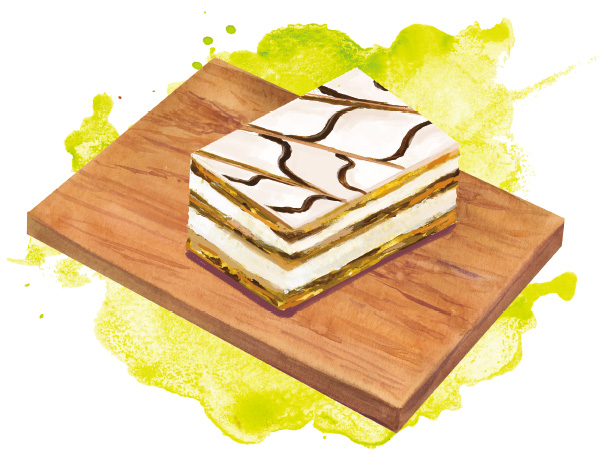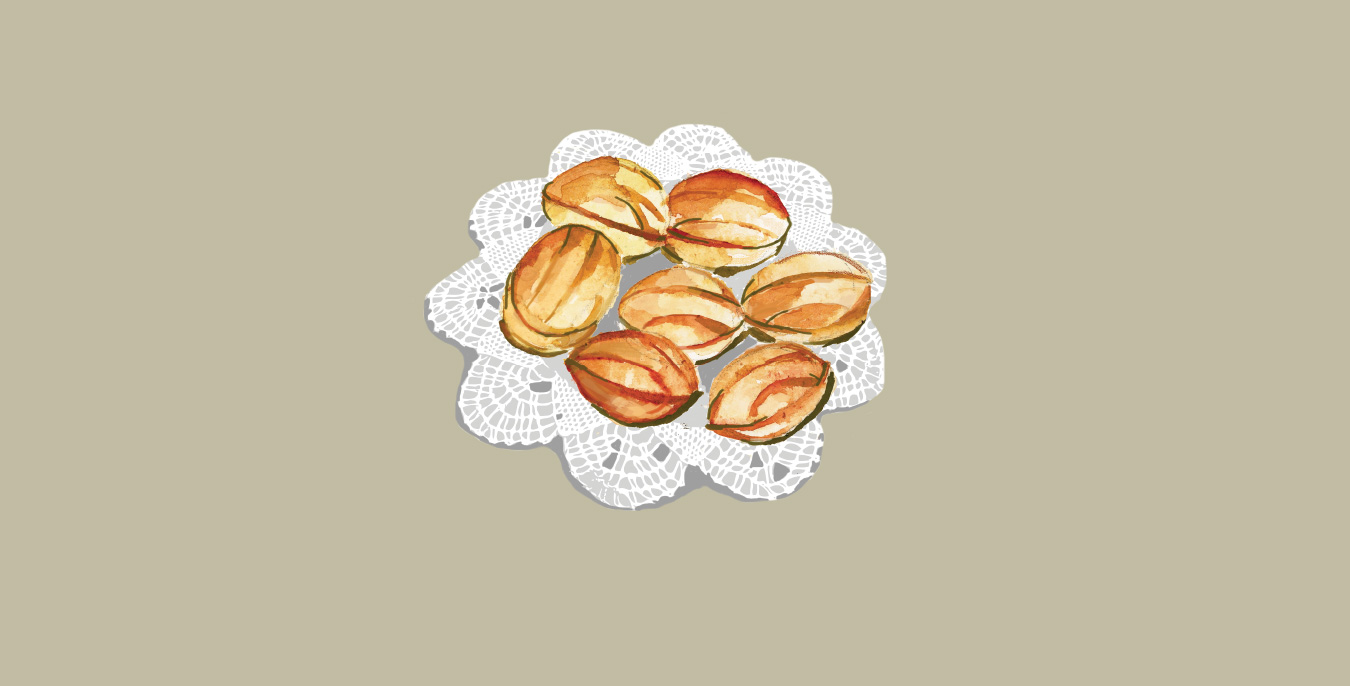It’s early Sunday afternoon. My fiancé and I have just arrived at my parents’ house. I look over to the passenger seat and give my wife-to-be a reassuring smile. To most observers it’s just an ordinary day, but today is the day I introduce my fiancé to my family.
The moment we walk through the door, the quiet and peaceful afternoon comes to a startling halt. Inside it is anything but peaceful. Everyone rushes toward us like a tidal wave, shouting their hellos and planting their wet kisses on both cheeks. My grandma hurries over, adorned in her floral covered apron, wiping her hands clean of the sticky dough that clings to her fingers, to meet the newest addition to the family.
My dad is firmly planted on his favorite spot on the couch watching one of his Russian soap operas; he nods and grunts a greeting. As we make our way through the living room, we finally end in the heart of it all––the kitchen. My stepmom is standing next to the stove, blissfully spooning out the foam of her golden chicken stock for tonight’s dinner. As I look around the kitchen I take in the smells and the sight of the whole production. I feel like I’m home.
When I was a child, unlike most kids my age, I yearned to be surrounded by the faces I recognized as easily as my own. I yearned for the house to be filled with the music of pots being stirred, the constant beat of a knife hitting the cutting board, the rhythmic banging of dough being kneaded, and the air thick with the promise of another satisfying meal. These are the things I think of when people ask me about my childhood.
Growing up as a first generation Latvian-Ukrainian, my parents tried to keep our family tethered to our cultural roots as much as possible. One of their ways of doing this was to instill in us the importance of family dinners. Every Sunday night anyone sharing our bloodline would gather together under one roof for a night of stories, laughter, libations, and of course, food. At school, my friends talked about their family dinners consisting of a total of four people sitting around a table and enjoying a quick bite. This entire notion seemed foreign to me at the time, more or less due to the fact that my family dinners took at least a day to prepare and lasted no less than four hours.
Every weekend I’d wake up to the sound of the coffee pot making its monotonous drip, drip, drip. My sister and I would jump out of bed and race down the stairs to join the gathering that had begun well before the sun had even risen. Entering the kitchen was an intoxicating experience. Laughter reverberated off the walls, orders were barked, arguments ensued, pots were banged. Life was happening.
We dutifully took our seats at the kitchen table, ready to peel the potatoes for mom’s salat olivier, which happened to be one of the only things my mom could successfully make. Appropriately known as Russian potato salad, it was the most amazing pairing of boiled potatoes, carrots, pickles, peas, bologna and mayo all mixed up together with fresh dill. As we peeled away the skin of the potatoes, we quietly nibbled on our danishes––mine filled with poppy seeds and my sister’s with cabbage, always purchased from Gold Label in Brighton Beach. Every time someone opened the oven door we were serenaded by the sweet and savory perfume of lamb braising in the oven, nestled in a pan with onions and carrots waiting to be turned into Plov, an indulgent lamb and rice pilaf.
One of my favorite memories is standing on a stool with my grandmother’s arms wrapped around me mixing together the batter for her coveted oreshki, or walnut cookies. Named after the shape they are baked into resembling a walnut shell, the cookies are a simple shortbread crust––but what made these cookies was the filling. Similar to a dulce de leche, the filling was sweet and luscious with caramel tones. Although these cookies can be found in almost any Russian supermarket, we rank them on a scale of how close they come to grandma’s, and in Brooklyn the closest thing can be found at Domino Russian Supermarket. I would shove my face in the bowl and deeply inhale the sweet and salty butter while watching my grandmother turn the dough into perfect crumbs. Her hands were wrinkled and spotted at the time. I remember looking at the spots and wrinkles, thinking that each of those marks had a story, and making those cookies together was her way of telling it to me.
When it was time to eat, pristine white linens adorned the dining room table. Grandma’s cobalt blue and cream fine china was taken out of the cupboards, the silverware polished to a glistening shine, and the table flooded with more food than could possibly be consumed. There were vareniki filled with tangy farmer’s cheese, beef stroganoff layered over a heaping pile of buttery mashed potatoes, pickled everything––from tomatoes to watermelon––seared cow tongue bathed in a golden brown mushroom sauce, soft as clouds pelmeni coated in sour cream––and that was just the first course. After the procession of appetizers and endless shots of vodka came the hot entrees.
My favorite was always the plov, its meat tender and juicy, and dissolving almost the moment it hit my tongue. My dad knew how much I loved this dish, and he always took more than he could eat so he could pass on the leftovers to me.

Being a pastry chef, it’s no wonder my favorite part of these meals always came at the end. A meal of such elaborate proportions couldn’t conceivably have just one dessert to cap it off; no, of course not. The dessert could have been a meal in itself. Platters of berries were presented on sterling silver trays adorned with fleur di lis. Bowls of cookies covered in nuts, dusted in sugar and dipped in chocolate joined the parade of sweets. Towering cake stands held masterpieces consisting of mousses, crèmes, pastry and tarts. My favorite above all else was the napoleon. It was a labor of love that took two days to prepare and endless amounts of devotion to pull off. A cake made up of over 40 layers of paper-thin crepes, filled with a velvety smooth custard so addicting that one bite would lead to countless more. This cake is the cake I dream about.
Of course there wasn’t always time to pull off a dinner of such magnitude every weekend. Some of the best dinners were held in one of Brooklyn’s many Russian banquet halls. Growing up in Long Island, we were fortunate enough to be so close to Brooklyn’s thriving Russian community. Back in the 90s, the most popular of these lavish halls was Rasputin, named after Russia’s favorite historic villain. The moment you walked past the heavy velvet curtains, the modern world ceased to exist; it was as if you were transported back to Imperial Russia, a time of reckless abandon, frivolity and excess. The music was loud, the booze flowed plentifully, and the tables were covered with enough food to feast on for a week. Although Rasputin has since closed its doors, it’s been reborn anew as Romanov, an equally impressive display. Others to join the ranks are Tatiana, Baku and Chinar, all located in South Brooklyn.
Back at that Sunday afternoon again, the table is crowded with grandparents, parents, children, and now the children of those children. My dad is standing up making a toast to love, family and a future worth waiting for. We all clink glasses and cheers––Na Zdorovie! As we pass around our plates I look around the table and am overwhelmed with love and pride. This is my tribe. I hold my fiancé’s hand in mine and give it a little squeeze. And as I notice my dad piling on his extra large portion of plov, he winks at me.







Our comments section is for members only.
Join today to gain exclusive access.